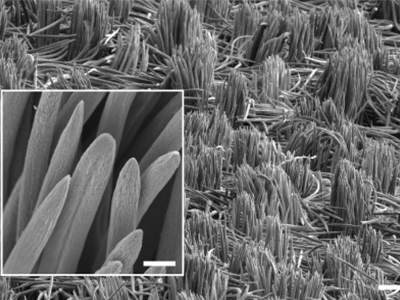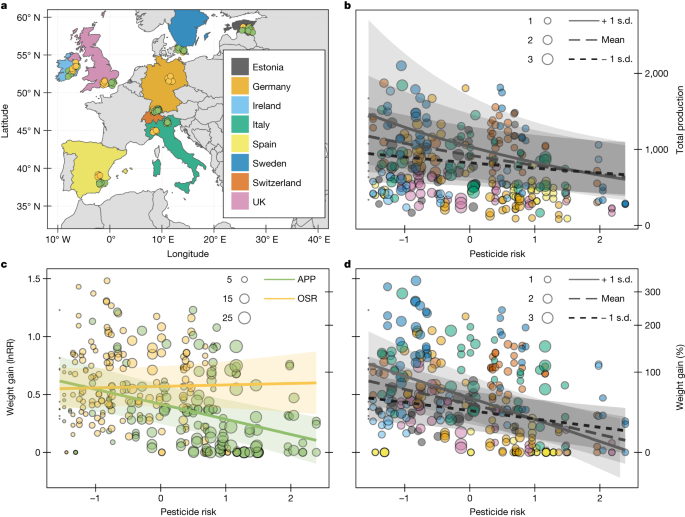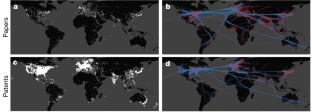-
Super hot plasma made easy with stabilising fibres

Read the paper here: A stable atmospheric-pressure plasma for extreme-temperature synthesis In a plasma, electrons separate from atoms and create a soup of charged particles that can be extremely hot and bright. This is particularly useful for manufacturing certain types of high temperature materials – and for experimenting with new materials. But plasmas can be…
-
Karen Kaplan (1959–2023)

Karen Kaplan, senior Careers editor.Credit: Nature We at Nature are saddened by the death of our colleague Karen Kaplan on 26 November, from a head and neck cancer that was diagnosed two years ago. Karen, who was based in Washington DC, joined the editorial team of Nature’s Careers section in 2008, from the US title…
-
On-surface synthesis of aromatic cyclo[10]carbon and cyclo[14]carbon
![On-surface synthesis of aromatic cyclo[10]carbon and cyclo[14]carbon](https://static.beescdn.com/news.myworldfix.com/2023/11/41586_2023_6741_Fig1_HTML.png)
Abstract All-carbon materials based on sp2-hybridized atoms, such as fullerenes1, carbon nanotubes2 and graphene3, have been much explored due to their remarkable physicochemical properties and potential for applications. Another unusual all-carbon allotrope family are the cyclo[n]carbons (Cn) consisting of two-coordinated sp-hybridized atoms. They have been studied in the gas phase since the twentieth century4,5,6, but…
-
Smart city construction and new-type urbanization quality improvement

Abstract First, utilising text quantitative analysis techniques, this paper analyses the smart city pilot policy in depth and clarifies its theoretical mechanism that influence the quality of new-type urbanisation. The revised entropy technique is then used to calculate the new-type urbanisation quality of 276 Chinese cities with a prefecture level or higher from 2007 to…
-
Pesticide use negatively affects bumble bees across European landscapes

Abstract Sustainable agriculture requires balancing crop yields with the effects of pesticides on non-target organisms, such as bees and other crop pollinators. Field studies demonstrated that agricultural use of neonicotinoid insecticides can negatively affect wild bee species1,2, leading to restrictions on these compounds3. However, besides neonicotinoids, field-based evidence of the effects of landscape pesticide exposure…
-
Remote collaboration fuses fewer breakthrough ideas

Abstract Theories of innovation emphasize the role of social networks and teams as facilitators of breakthrough discoveries1,2,3,4. Around the world, scientists and inventors are more plentiful and interconnected today than ever before4. However, although there are more people making discoveries, and more ideas that can be reconfigured in new ways, research suggests that new ideas…
-
Global science is splintering into two — and this is becoming a problem

Chinese President Xi Jinping and US President Joe Biden met this month in California.Credit: Brendan Smialowski/AFP/Getty It’s no secret that research collaborations between China and the United States — among other Western countries — are on a downward trajectory. Early indicators of a possible downturn have been confirmed by more sources. A report from Japan’s…
-
Microbiology must be represented at climate change talks
But Peixoto found one aspect of the meeting particularly unsettling: in all the climate discussions, microbes were effectively omitted. “We should be looking at the most important player of the equation, the microbes. [All the climate crises] are driven by microbes, disturb microbes, or can be solved by microbes”, she recalls thinking. Yet, other microbiologists…
-
Climate and health strategies must take vaccination into account
Climate-driven shifts in temperature, precipitation and nutrient availability are altering the transmission and distribution of human, animal and plant pathogens. More than half of all infectious diseases that affect humans are aggravated by climate change, with low- and middle-income countries (LMICs) bearing a ten-times-higher burden of infectious diseases than their affluent counterparts1,2. Despite contributing little…
-
Cellular development and evolution of the mammalian cerebellum
Abstract The expansion of the neocortex, a hallmark of mammalian evolution1,2, was accompanied by an increase in cerebellar neuron numbers3. However, little is known about the evolution of the cellular programs underlying cerebellum development in mammals. In this study, we generated single-nucleus RNA-sequencing data for ~400,000 cells to trace cerebellum development from early neurogenesis to…